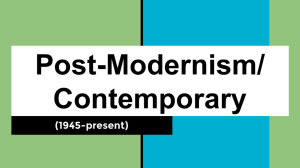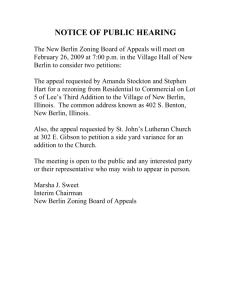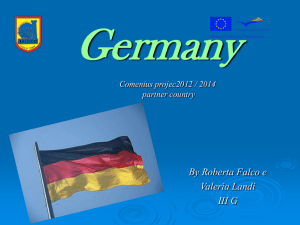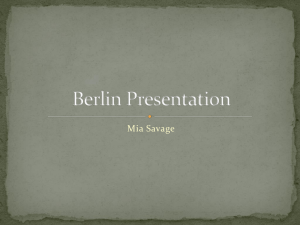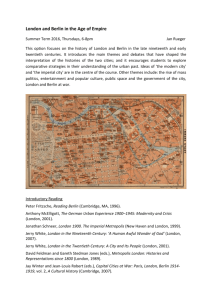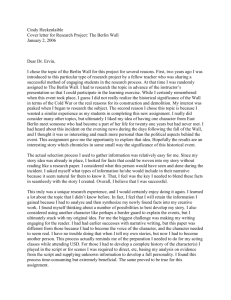Experience report
advertisement
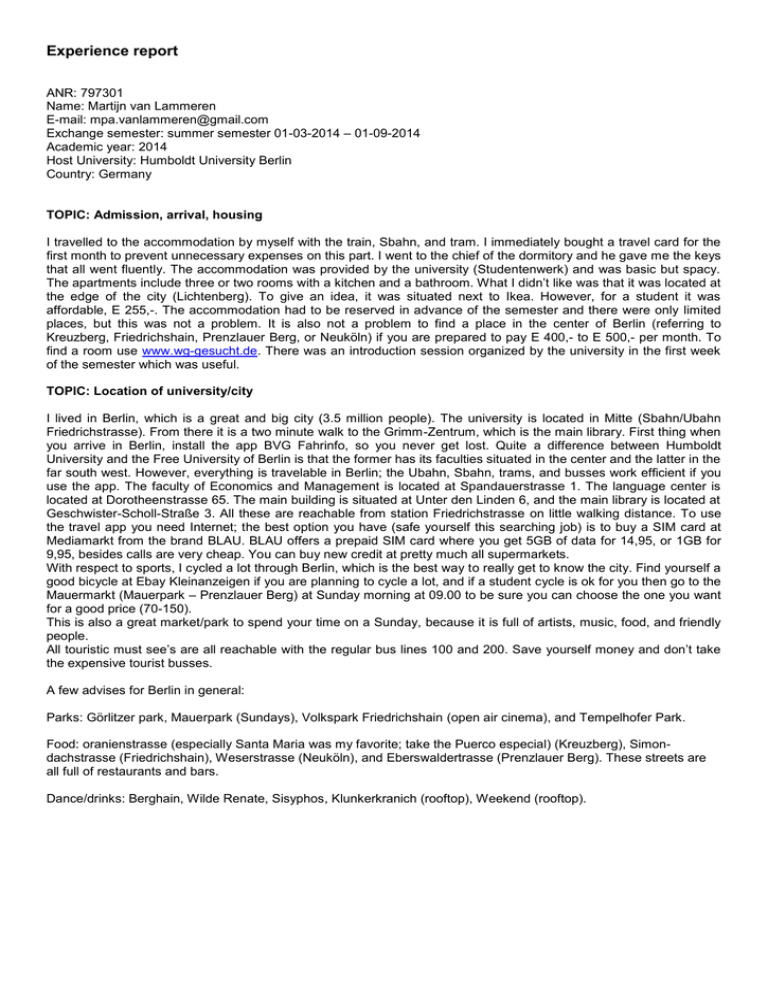
Experience report ANR: 797301 Name: Martijn van Lammeren E-mail: mpa.vanlammeren@gmail.com Exchange semester: summer semester 01-03-2014 – 01-09-2014 Academic year: 2014 Host University: Humboldt University Berlin Country: Germany TOPIC: Admission, arrival, housing I travelled to the accommodation by myself with the train, Sbahn, and tram. I immediately bought a travel card for the first month to prevent unnecessary expenses on this part. I went to the chief of the dormitory and he gave me the keys that all went fluently. The accommodation was provided by the university (Studentenwerk) and was basic but spacy. The apartments include three or two rooms with a kitchen and a bathroom. What I didn’t like was that it was located at the edge of the city (Lichtenberg). To give an idea, it was situated next to Ikea. However, for a student it was affordable, E 255,-. The accommodation had to be reserved in advance of the semester and there were only limited places, but this was not a problem. It is also not a problem to find a place in the center of Berlin (referring to Kreuzberg, Friedrichshain, Prenzlauer Berg, or Neuköln) if you are prepared to pay E 400,- to E 500,- per month. To find a room use www.wg-gesucht.de. There was an introduction session organized by the university in the first week of the semester which was useful. TOPIC: Location of university/city I lived in Berlin, which is a great and big city (3.5 million people). The university is located in Mitte (Sbahn/Ubahn Friedrichstrasse). From there it is a two minute walk to the Grimm-Zentrum, which is the main library. First thing when you arrive in Berlin, install the app BVG Fahrinfo, so you never get lost. Quite a difference between Humboldt University and the Free University of Berlin is that the former has its faculties situated in the center and the latter in the far south west. However, everything is travelable in Berlin; the Ubahn, Sbahn, trams, and busses work efficient if you use the app. The faculty of Economics and Management is located at Spandauerstrasse 1. The language center is located at Dorotheenstrasse 65. The main building is situated at Unter den Linden 6, and the main library is located at Geschwister-Scholl-Straße 3. All these are reachable from station Friedrichstrasse on little walking distance. To use the travel app you need Internet; the best option you have (safe yourself this searching job) is to buy a SIM card at Mediamarkt from the brand BLAU. BLAU offers a prepaid SIM card where you get 5GB of data for 14,95, or 1GB for 9,95, besides calls are very cheap. You can buy new credit at pretty much all supermarkets. With respect to sports, I cycled a lot through Berlin, which is the best way to really get to know the city. Find yourself a good bicycle at Ebay Kleinanzeigen if you are planning to cycle a lot, and if a student cycle is ok for you then go to the Mauermarkt (Mauerpark – Prenzlauer Berg) at Sunday morning at 09.00 to be sure you can choose the one you want for a good price (70-150). This is also a great market/park to spend your time on a Sunday, because it is full of artists, music, food, and friendly people. All touristic must see’s are all reachable with the regular bus lines 100 and 200. Save yourself money and don’t take the expensive tourist busses. A few advises for Berlin in general: Parks: Görlitzer park, Mauerpark (Sundays), Volkspark Friedrichshain (open air cinema), and Tempelhofer Park. Food: oranienstrasse (especially Santa Maria was my favorite; take the Puerco especial) (Kreuzberg), Simondachstrasse (Friedrichshain), Weserstrasse (Neuköln), and Eberswaldertrasse (Prenzlauer Berg). These streets are all full of restaurants and bars. Dance/drinks: Berghain, Wilde Renate, Sisyphos, Klunkerkranich (rooftop), Weekend (rooftop). TOPIC: Academics Courses Social Cooperation (philosophy) Theories of Well-Being (philosophy) Deutsch Intensivkurs Deutsch B2.1 Spanish A1 Performance/theater course ECTS 6 6 7 5 5 4 Total 33 This part is not very useful for business students to read, as I didn’t take any business courses. At the beginning I attended Financial Statement Analysis and Advanced Corporate Finance. But unless you have some background in accounting for the former and in finance for the latter, I would not advise them. FSA is a good and very interesting course but not for the amount of credits you get (3), and advanced corporate finance was just too hard for me to combine with all of my other courses. I chose to focus on courses which I found interesting and whereof I knew I could finish them with certainty. Therefore, and since I already graduated my master Strategic Management, I decided to attend courses which would in my opinion genuinely add to my program and which would reflect my interests. Besides, I thought my CV would perhaps become more eye-catching if I would include new topics and languages into my program instead of just more management courses. Just one advice with respect to subscribing for courses: be the first. There are limited places for certain classes. Although the international office of Humboldt will tell you that you don’t have to worry about subscription for courses, you have to for certain classes, the best thing you can do is contact professors one or two months before you go to Berlin and ask about the procedure. Philosophy To gain a deeper understanding of management but then from a different perspective I chose two philosophy courses. This was also advised to me at my graduation internship at Rabobank. The course Social Cooperation gave me insights in the interaction between persons and groups and their intentions to work together or not. The course Theories of Well-Being treated the topic of the good life viewed from a hedonist, preference theorist, and objective list theorist perspective. For me this was an interesting course because I was able to gain an understanding of the good life from a management/economist perspective and thus the question arose: what makes a good life for (managed) people? Both courses included extensive preparation for every class of both German and English articles of more or less 30 pages of tough philosophical text on a weekly basis. Both courses included a paper presentation and a paper of 12 pages each. Contact hours: 2 hours a week per course. The topics of the course were sometimes pretty hard to understand especially because the discussions were held in German. Languages As I aspire an international career I joined three language courses to improve my languages. I joined one language course in advance of the semester and two during the semester. The German intensive course was a 4 week course which appeared extremely useful. Therefore I decided to take another German course on a higher level during the semester (4 hours a week). One remark here is that my level of the German language at Tilburg University was B2 but my level appeared to be B1 in Germany, so just be aware that there may be a difference between your level here and there. I wanted to learn German because I believe that Germany with its strong economy and its reputation of being the face of the EU presents the second most important European language at the moment. I took a Spanish course because I believe this is also a very important world language spoken in more than 20 countries. Also this course included a 4 hour class on a weekly basis. The courses add to my program at Tilburg University in the sense that I really didn’t have time to practice languages during my premaster and master because I was too busy with the main courses. However, if you don’t practice languages you never learn more languages than English as a Tilburg University student. The level of the courses was according to my level based on an entry test. Performance/theater course This course provided me the chance to get along with German (speaking) people a lot. In a friendly atmosphere we got trained in the field of theatrical performance which was really great. The course consisted of weekly 3 hour training and one whole weekend. This course was offered by the faculty of Education Science. It added to my skills in the form of presenting skills, German language skills, and teambuilding skills. TOPIC: Social life Social activities were often organized by students themselves. The university took limited responsibility for that. What was good is that the things that were organized by the university were well communicated via email, every month a program was sent to all students including all information about events. However, one should just catch up with others and organize stuff, there are plenty of students and they all want to have a nice time, so no worries about that. Through my performance course I had contact with local students, but I guess local students do not come into contact with international students at all for the rest. With the people from the performance course I had weekly drinks, I also hung out a lot with people I met at the intensive language course. Next to that I had quite a few friends visiting me. TOPIC: Living costs My living expenses were E 1075,- per month. Some of my costs were the following: Rent Internet Having a life (food etc.) Travel card Study expenses Travel first month Curtains, cups, plates Sheets and pillow pocket Sports room Laundry Bicycle Printing money Salsa course Leipzig weekend stay 255 (month) 80 (in total) 600 (month) 220 (semester) 200 (semester) including 2 language courses of 80 in total 78 (once) 68 (once) 50 (once) 25 (once) 30 (in total) 215 (needed to cycle 22km a day, good luck with a cheap bike then) 40 (in total) 20 (once) 50 (excluding expenses of course) I financed the period through my savings. The grant from university was very helpful in paying the rent and study expenses. TOPIC: Culture I did not experience a culture shock with Germany. In the beginning there was an old man who tried to hit me from my bicycle because apparently I was not allowed to cycle there, and once somebody asked me to lower my voice in the tram while I was having a conversation with my friend on a sunny Saturday morning. But those things could also happen in the Netherlands. Besides, Berlin is not really Germany. Some people might be surprised by the alternative people on the street, beggars, all the gravity everywhere, and people drinking beer on the street everywhere. To me these things made the city cozier. A Sunday at Mauerpark may include people drinking beers all day while being entertained by brilliant artists who give you a show for free, while people will ask for your empty beer bottle to afford their living. Although the city is very big, I wouldn’t feel safer elsewhere. There are always people everywhere and nobody seems to be bored. The public traffic is great in Berlin, you can get everywhere 24/7 and they don’t make use of a horrible chip-card like in the Netherlands which costs you tons of money. With respect to the public traffic: certain trams drive 24/7, Sbahn and Ubahn drive till 00.00 during the week and on Fridays and Saturdays 24/7. I really did not experienced cultural differences. In my opinion German people (or Berlin people) are just as Dutch people only they speak another language. I would compare the atmosphere of Berlin with Amsterdam, only Berlin being more alternative. In other words, hipster in Amsterdam would mean Skotsch and Soda and hipster in Berlin may be described as second hand clothes and dreadlocks. I learned about my own culture that Dutch people are always ready to give their opinion about everything and anybody, and that is what I loved so much about Berlin, that they don’t do that, or at least not in Berlin. Let a person be who he or she wants to be, don’t judge. Sometimes it felt like people are still living like the Berlin wall fell yesterday, they are so happy and friendly. TOPIC: Personal development When I joined the culture workshop at Tilburg University the teacher told us the following: you won’t see culture untill you suddenly realize that you experienced culture. I had that during a weekend trip. I could get along with some people really well but after one day they had the feeling that we were already best friends and this pushed me away. Every student will notice this by his- or herself, that you should carefully get to know people, don’t give all at once. It may be the other way too, that you like people a lot and suddenly they don’t want to hang out with you anymore. Now I realize that this was a cultural difference I will be more careful next time and keep people on a certain distance in the beginning, just because hanging out with the people may could have been really fun, but I didn’t want it anymore because I allowed them to come too close too soon. I put this in this section because it has nothing to do with the German culture; it was more about getting along with other international cultures. My best experience was my girlfriend visiting me for two weeks and my worst experience was my roomy without social manners. I will remember that Japanese people are great and funny, that two guys I met from Cameroon should have developed some more social manners during their childhood (one guy in the flat with loud music which he wouldn’t turn off and my roomy who was very lazy in the sense of cleaning. When I said something about that he started screaming at me so loud that it more or less scared me), and that Turkish people are very friendly and like to party a lot. I will also never forget that when a German person means clean, he means brand super clean, or ‘’sauber’’, as my dormitory chief named it. I will never forget the almost weekly drinks in Mauerpark in the sun with the great artists over there, the theater performance, my friends thereof, our great teacher, the great parties I went to, and the time I spent with friends who visited me. The most important lesson I learned is that if you want to reach something in life then work for it yourself and use all your creativity to get there. That is exactly what Berlin people do. TOPIC: Tips for future students I would recommend an exchange period to anyone, it is a great opportunity to enrich your life experience. I would recommend Humboldt University but I would like to warn students to have a good look at the offered courses in advance of choosing their Erasmus location. I would like to advise people to use the Dutch website Berlin Blog (www.berlijn-blog.nl) to gain some knowledge about Berlin (other than basic information). I would also like to advise students to refresh their knowledge of the German language before going to Berlin. A few pictures to give an idea of the atmosphere. Drinks with friends from the performance course. Me and my friends of the performance course, closing diner. Me and some of my friends at Klunkerkranich (Neuköln). The main library (Grimm-Zentrum) A sit-down for a drumming band just in the park (Mauerpark) on a Sunday afternoon, great! www.putoproduction.de
